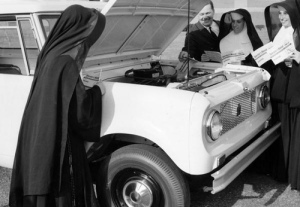No matter how you feel about the very fraught subject of healthcare, I think we can reach a bipartisan agreement that Representative Bart Stupak’s dismissive comments and attitude towards nuns is highly objectionable and flagrantly disrespectful–and rather unnecessary.
As Stupak’s right-to-life language became newsworthy, he was sent a letter from religious leaders organized by NETWORK, a Catholic social justice lobby. Sister Marlene Weisenbeck, FSPA, the president of the Leadership Conference of Women Religious (LCWR) represents approximately 59,000 women religious (colloquially, nuns).
In response, Stupak said, “When I’m drafting right to life language, I don’t call up the nuns.”
Not only was he disrespectfully dismissive of women religious involvement in health care, but also harsh and misunderstanding of the most crucial dynamics of this issue; he said he discussed this issue with leading bishops, Focus on the Family, and the National Right to Life Council instead. Focus on the Family is rather politically involved and Focus on The Family Action does not have the lobbying restrictions of 501 (c) 3, but rather a 501 (c)(4)–a social welfare group, and is more politically active.
In my last blog post, I mentioned an interview with Dr. John Knight, a professor in my school’s Religious Studies department and the coordinator of the Catholic Studies program. In that same discussion, we touched on a difference in leadership styles between the Catholic Church, which tends to be ‘top-down’ as bishops shape policy, and Methodism, a denomination whose Annual and General Conference include the votes of both clergy and lay representatives in the policy process.
The divison between many nuns and some, but not all, leading bishops, highlights this paradigm’s application to this issue : a large number of nuns serve in hospitals and other health care organizations. Religious orders have a long history of direct action and involvement in social justice issues.
Stupak, a former police officer with a Juris Doctorate, whose legislation focus, prior to the heath care reform bill was seems, from his biography, to be the Energy and Commerce Committee, would do well to speak with and heed the opinion of women, who having dedicated their life to service, often work on the front lines of health care.
______________
John Nichol’s blog at The Nation summarizes Catholic support for the law, formerly known as a bill.
The Revealer on religious exemptions from health care reform

